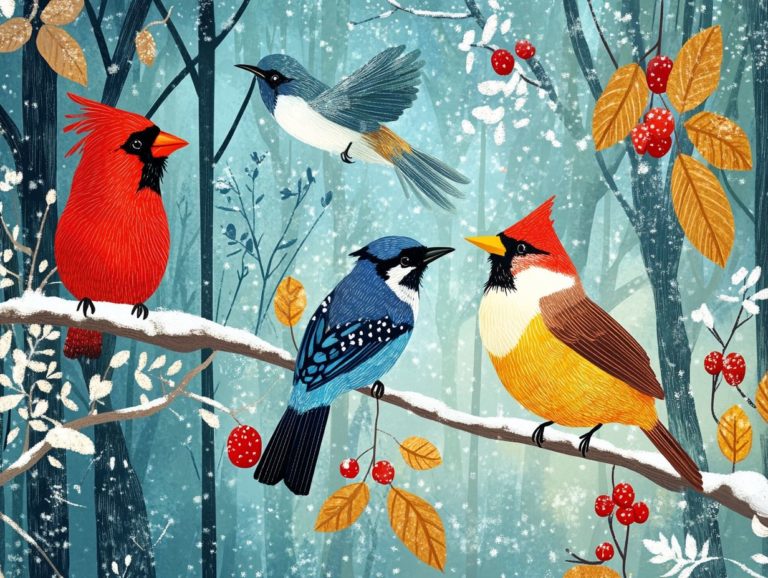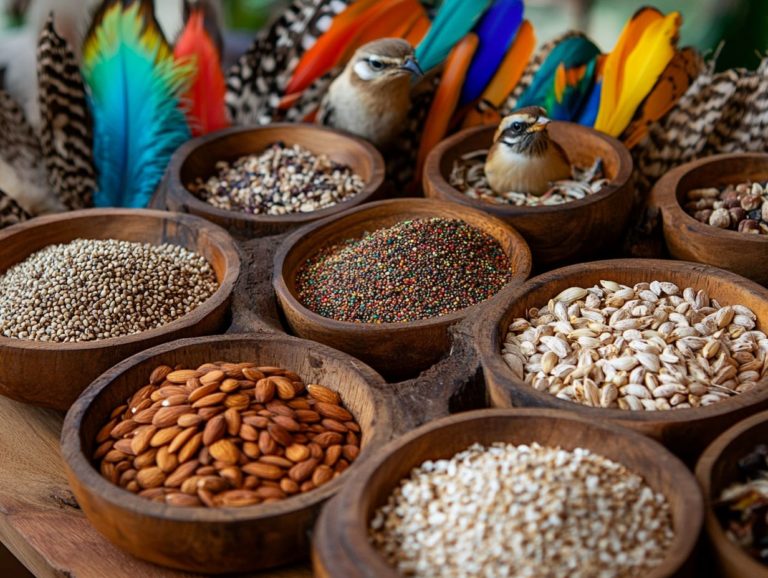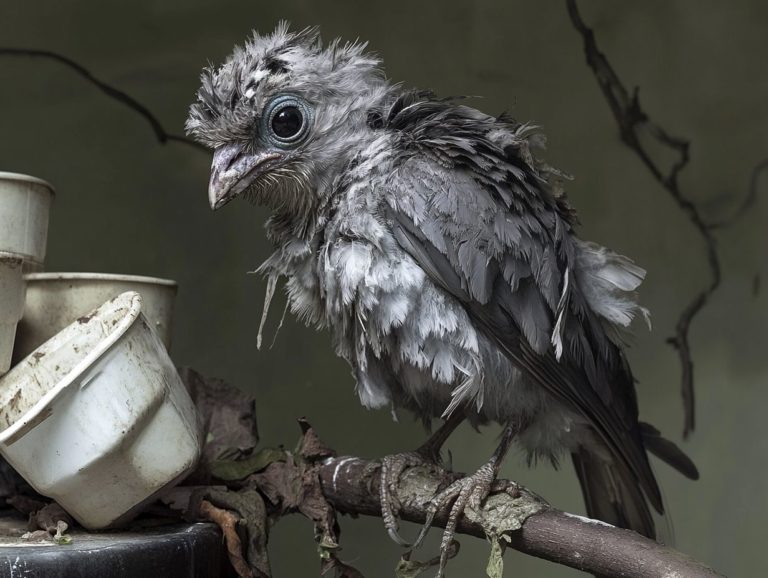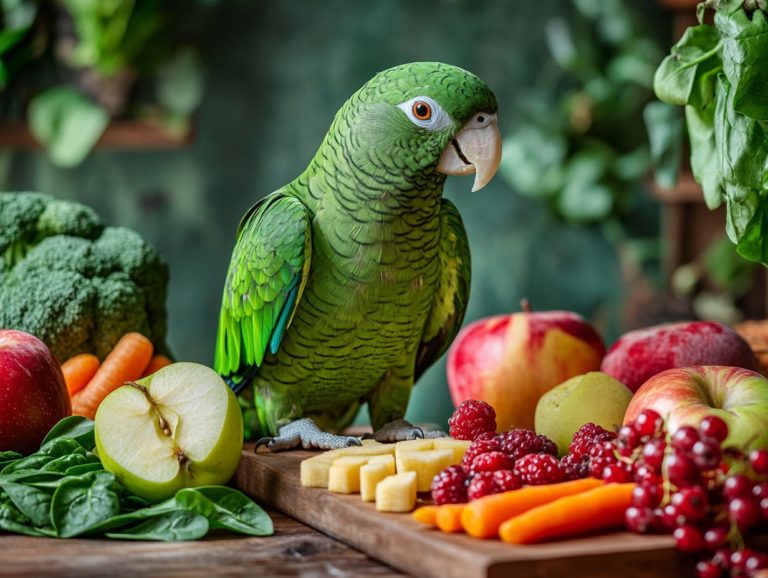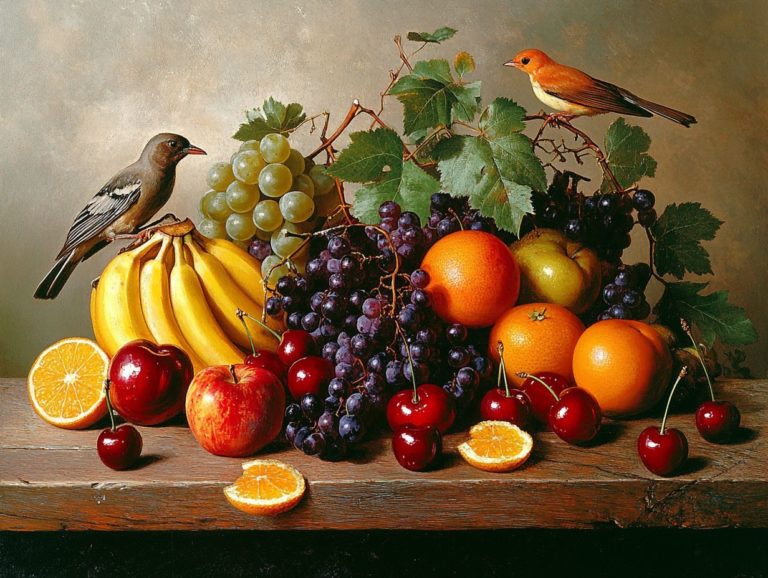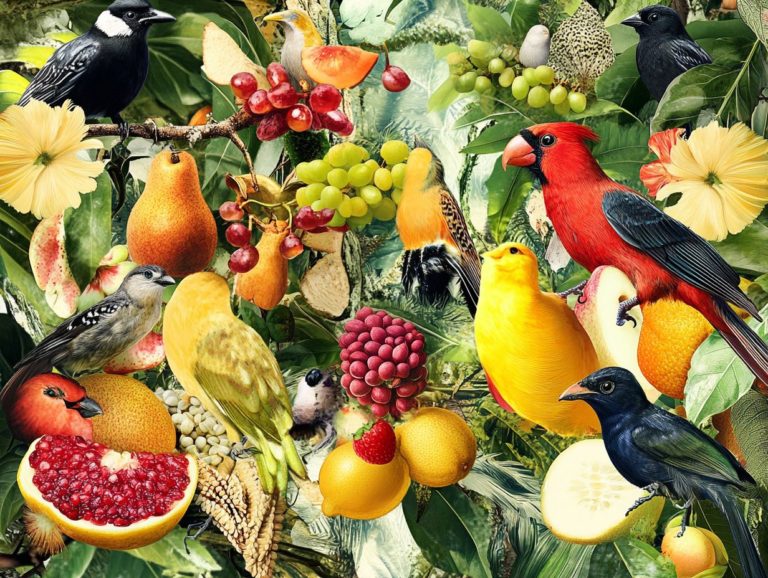5 Signs Your Bird is Not Eating Enough
Are you concerned about your feathered companion s health? Just like humans, birds can face challenges with their diet.
This article delves into five crucial signs that suggest your pet bird might not be getting enough to eat, ranging from noticeable weight loss to changes in droppings.
It also outlines what a healthy diet looks like, common reasons for a decreased appetite, and tips for encouraging your bird to eat more.
You’ll also discover when it s time to seek veterinary assistance and how to prevent malnutrition. Understanding your bird’s needs is the first step toward ensuring its well-being!
Contents
- Key Takeaways:
- 1. Your Bird Is Losing Weight
- 2. Changes in Droppings
- 3. Lethargy and Weakness
- 4. Changes in Feather Quality
- 5. Lack of Appetite
- What Is Considered a Healthy Diet for a Pet Bird?
- Frequently Asked Questions
- What are the signs that my bird is not eating enough?
- Why is weight loss a sign that my bird is not eating enough?
- How does decreased activity indicate that my bird is not eating enough?
- Why is feather plucking a sign of not eating enough?
- Can changes in droppings indicate that my bird is not eating enough?
- How can changes in behavior indicate that my bird is not eating enough?
Key Takeaways:
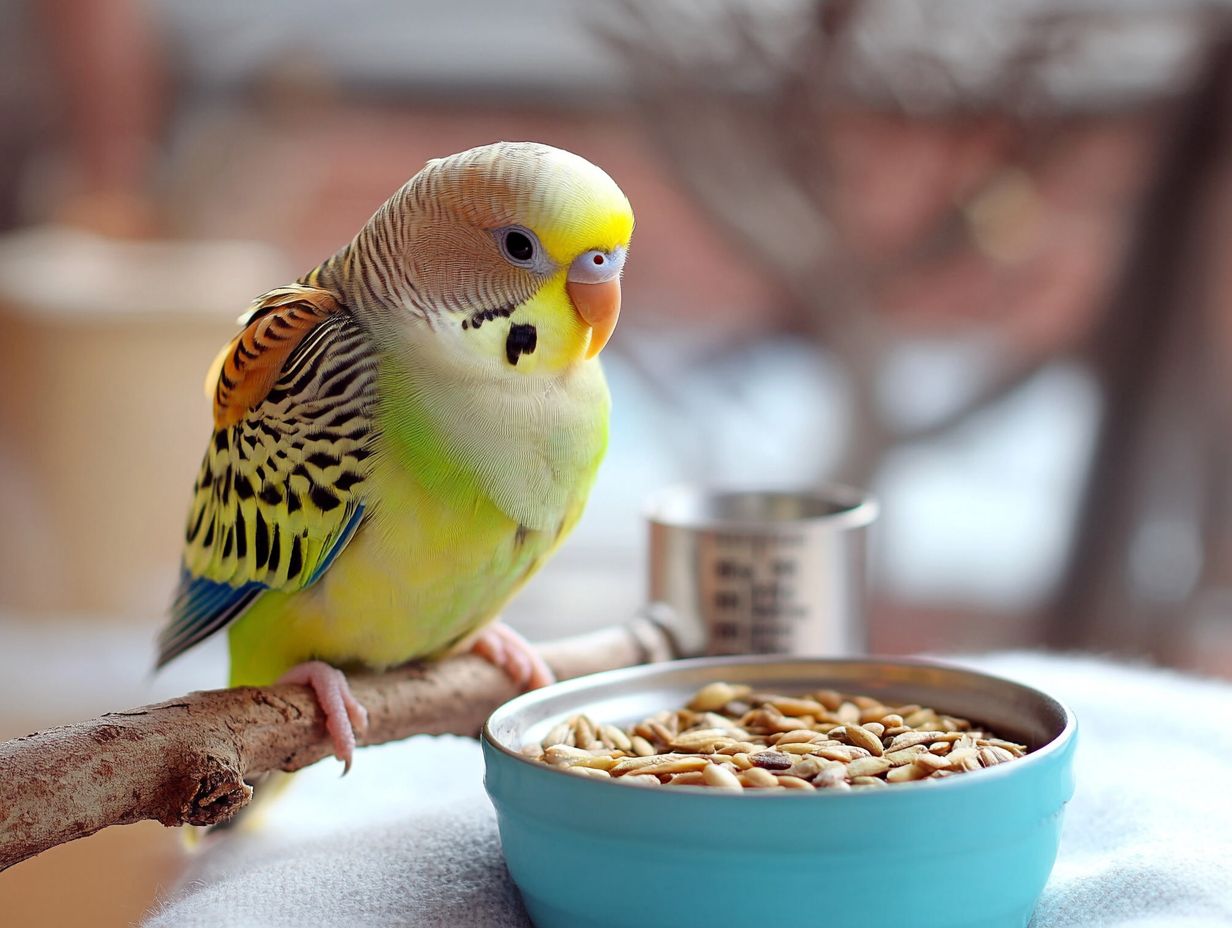
- Unexplained weight loss? Act now!
- Changes in droppings? Don’t ignore these signals!
- Lethargy and weakness? Seek help immediately!
1. Your Bird Is Losing Weight
When your beloved parrot or pet bird is losing weight, it s a clear sign that something isn t right. This could indicate not getting enough nutrients or an underlying health issue that needs immediate attention from an avian veterinarian.
Weight loss in birds can stem from various factors, such as diet changes, stress from a new environment, or illness. Therefore, closely monitoring their eating habits and energy levels is essential.
To track effectively, keep a regular log of their weight aim to weigh them weekly and look for any fluctuations that could indicate health concerns. Common reasons for weight loss often include inadequate nutritional intake or a lack of variety in their diet.
Understanding their dietary needs is vital. Incorporating a balanced mix of seeds, fruits, vegetables, and pellets can significantly boost their well-being. If you notice concerning weight changes, act quickly! Consult your avian veterinarian to diagnose potential medical conditions and develop an appropriate dietary plan.
2. Changes in Droppings
Observing changes in your bird’s droppings can provide crucial insights into its health, hydration levels, and dietary habits essential elements for ensuring your pet’s overall well-being.
Normally, you want to see firm, well-formed droppings with a variety of colors reflecting your bird’s diet, complete with a harmonious blend of solids, liquids, and urates. However, if you notice drastic changes like w watery feces, a lack of urates, or unusually dark or light colors it may signal potential health issues such as dehydration or not getting enough nutrients.
These variations can often be traced back to recent shifts in nutrition, underscoring the significance of a balanced diet abundant in fresh fruits, vegetables, and high-quality pellets. If the alterations persist, it may be wise to consider the possibility of infestations like parasites or underlying health conditions that could require a visit to the veterinarian.
3. Lethargy and Weakness
Lethargy and weakness in your bird can signal serious health concerns, often hinting at underlying illnesses, nutritional deficiencies, or environmental stress that require immediate veterinary attention.
When your bird shows these symptoms, you might also notice changes in social behavior, a decrease in vocalization, or disinterest in activities that usually bring them joy. These alterations can be distressing for both you and your bird.
To maintain optimal energy levels, providing a balanced diet rich in vital nutrients is essential. Regular monitoring can help you catch any issues early.
If lethargy lasts more than a day or is accompanied by changes in appetite or abnormal droppings, consult an avian veterinarian for a thorough evaluation and appropriate intervention.
4. Changes in Feather Quality
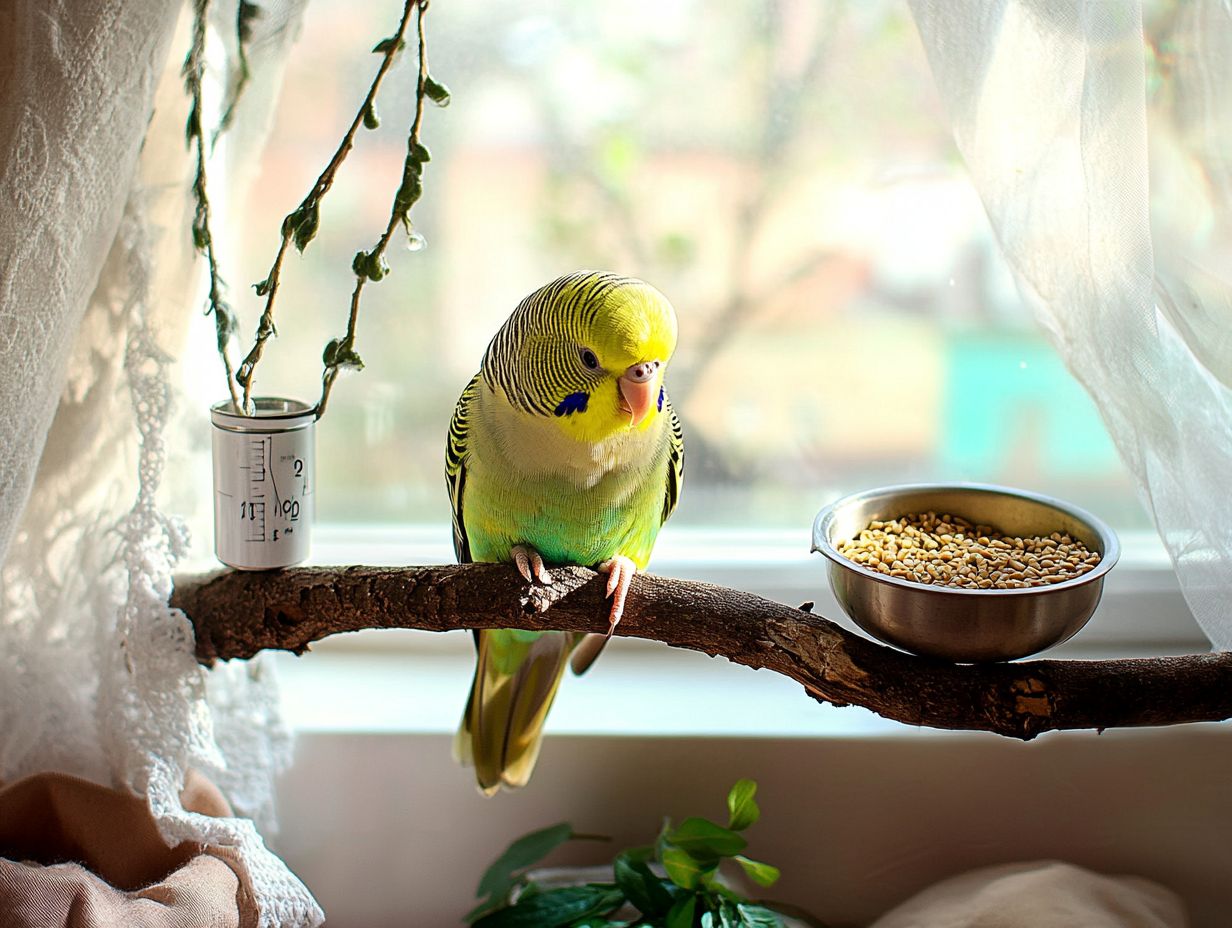
Changes in your bird’s feather quality can serve as a clear indication of its overall health, often uncovering potential nutritional issues or vitamin deficiencies that warrant immediate attention.
For example, insufficient levels of proteins, fatty acids, and key vitamins like A, D3, and E are crucial for maintaining vibrant and healthy feathers. Watch for signs of poor feather quality. These include brittleness, dull coloration, and excessive molting. These symptoms not only detract from your pet’s appearance but also signal potential health risks. Recognizing these symptoms is vital, as addressing them early can lead to more effective treatment outcomes.
It’s wise to consult an avian veterinarian who can conduct a thorough evaluation, pinpoint any underlying dietary deficiencies, and recommend healthy foods to promote optimal feather condition.
5. Lack of Appetite
A lack of appetite in birds can lead to malnutrition. Address this issue promptly, as it can significantly impact their behavior and energy levels.
Several factors can contribute to this concerning situation. Stress from changes in their environment, like moving to a new home or introducing new pets, can disrupt their eating habits. Illnesses, ranging from minor infections to more serious health problems, can also lead to a decline in food intake.
As a dedicated bird owner, you must keep a close eye on your pet’s feeding habits. Take note of any changes in their food preferences, as these details can offer valuable insights into their well-being and dietary transition.
If your bird exhibits persistent signs of decreased appetite or seems lethargic, it may be time to consult an avian veterinarian. Ensure they receive appropriate care and attention necessary for their health.
What Is Considered a Healthy Diet for a Pet Bird?
A balanced and healthy diet for your pet birds, including parrots and other species, is key to their well-being. This diet should consist of a variety of fresh foods, soft options, and specialized choices like pellet-based and seed-based diets to meet their dietary needs.
Incorporating fresh fruits and vegetables is essential; they provide vital vitamins and minerals that support your bird’s overall health. High-quality pellets are a foundational component of their diet, offering a consistent nutrient profile that many seeds simply can t match. Don t underestimate the importance of hydration. Ensuring your bird has access to fresh water daily is crucial for maintaining optimal bodily functions.
Integrating essential fatty acids promotes a shiny coat and healthy skin. If you’re transitioning from a seed-based diet, take your time. Gradually introduce new foods to help your bird adjust and embrace a healthier lifestyle.
What Are Some Common Causes of Decreased Appetite in Birds?
Many reasons can lead to a bird not eating well, ranging from environmental stressors and health issues to dietary changes that might unsettle their food preferences.
When birds encounter changes in their surroundings, like moving to a new home or the arrival of new pets, they can experience anxiety. This often disrupts their normal eating habits. Additionally, potential health problems, such as infections or digestive issues, can significantly influence how much your bird decides to eat. Don t overlook the possibility of parasites, which can interfere with nutrient absorption and overall vitality.
To assist with dietary transitions, you can introduce new foods gradually, pairing them with familiar favorites to encourage exploration. Creating a calm, stress-free environment and scheduling regular vet check-ups can further enhance your bird s well-being and improve their appetite.
How Can You Encourage Your Bird to Eat More?
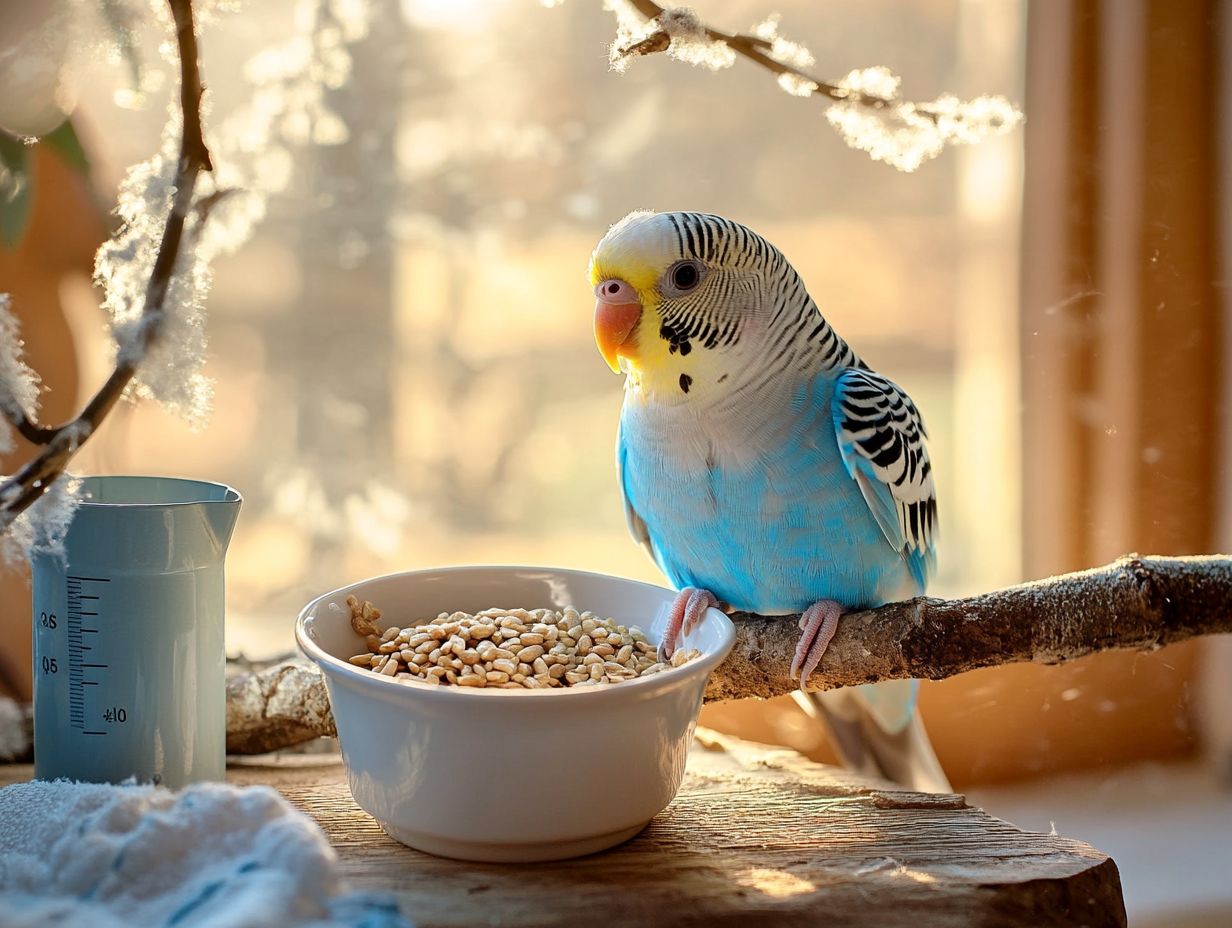
Encouraging your bird to eat more can be accomplished through various methods. One effective way is to introduce fresh food options, like favorite fruits. Engaging in behavioral changes can also stimulate their interest in dining and provide mental stimulation.
Presenting food in an attractive display is another effective strategy. Birds are drawn to bright colors and interesting shapes, so make their meals visually appealing. Offering a mix of textures, such as crunchy vegetables alongside soft fruits, can spark their curiosity and encourage them to try new tastes.
Observe which foods your bird enjoys the most and adjust your offerings accordingly. Tracking their eating habits will help you identify trends and make necessary changes, ensuring their meals remain enticing while promoting a balanced diet.
When Should You Seek Veterinary Care for Your Bird’s Poor Appetite?
If your bird has a poor appetite that lingers despite your efforts, it might be time to consult a bird doctor. A thorough examination and possibly a blood test can help rule out serious health issues.
If your bird seems unusually tired or you notice changes in droppings, these can indicate digestive problems or infections. These symptoms highlight the importance of early intervention. Addressing these signs promptly enhances the likelihood of a better outcome and helps your feathered friend stay healthy for years to come.
What Are Some Nutritional Supplements for Birds?
Nutritional supplements can significantly enhance your bird’s diet by providing essential vitamins like D3 and A, along with calcium and protein to support overall health.
These supplements can address specific nutritional deficiencies that may arise from a limited diet. This ensures your feathered companion receives a balanced intake of nutrients vital for growth, feather development, and immune function.
Among the options available, products like powdered vitamins, calcium blocks, and protein-rich pellets can be easily integrated into your bird’s daily routine.
Observe your bird’s unique needs and preferences, gradually introducing any new supplements. Before making dietary changes, consulting a bird doctor can help you select the most suitable options for your bird’s species and health condition.
How Can You Prevent Your Bird from Becoming Malnourished?
Preventing malnutrition in your pet bird requires a proactive approach to understanding their dietary needs. Foster healthy feeding habits and ensure balanced avian nutrition.
By offering a diverse mix of seeds, fruits, and vegetables, you can meet your bird’s nutritional requirements. Monitor how much food your bird consumes each day; this helps catch any potential issues early. Don t forget that providing fresh water is just as vital.
Be aware of signs of nutritional deficiencies, which can show up as changes in feather quality, lethargy, or unexpected weight loss. Regular veterinary check-ups are essential for promoting overall health. A professional can provide tailored advice and ensure your dietary strategies align with your bird’s needs.
Frequently Asked Questions
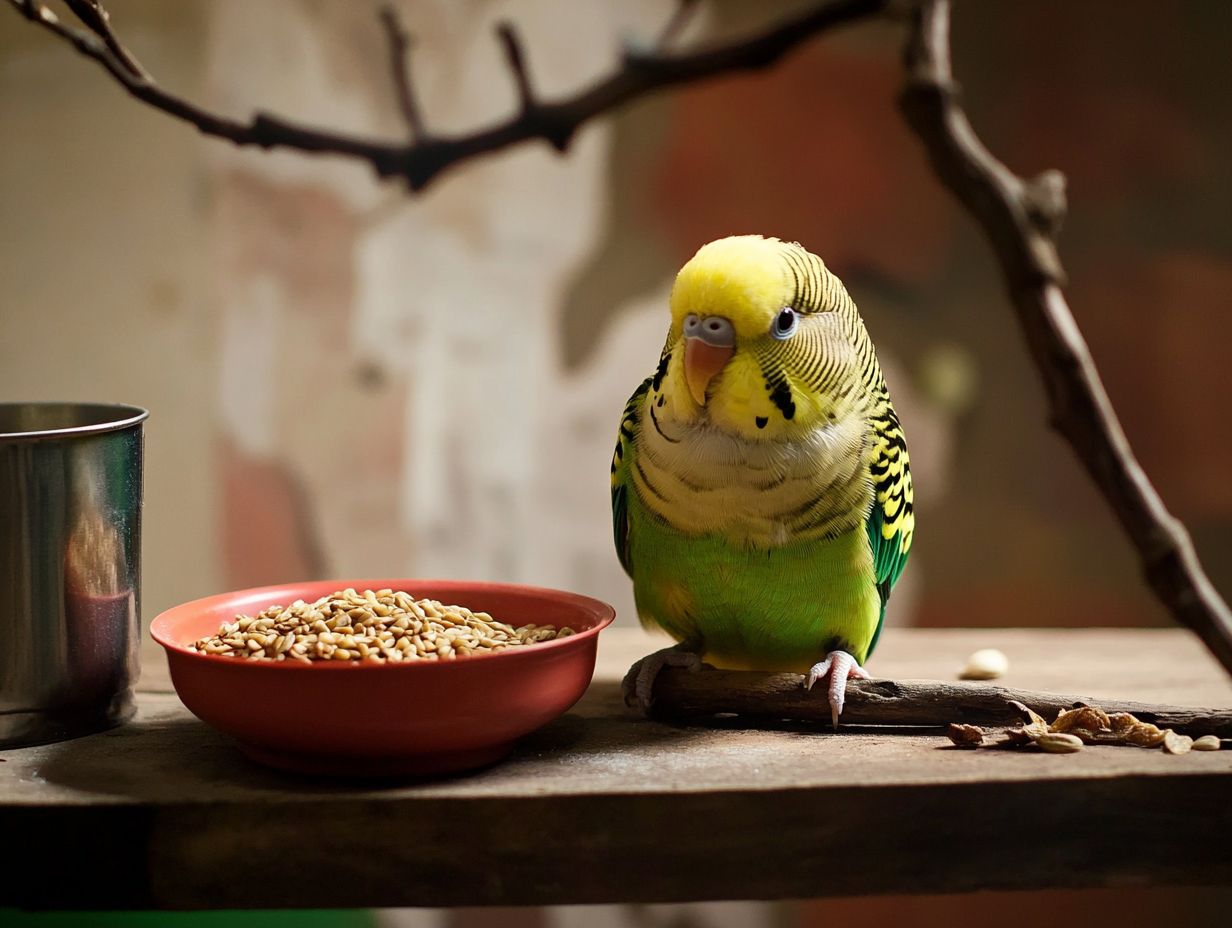
What are the signs that my bird is not eating enough?
The five common signs that your bird is not eating enough include weight loss, decreased activity, feather plucking, changes in droppings, and changes in behavior.
Your bird s health and happiness depend on your attention! Consult with your bird doctor today!
Why is weight loss a sign that my bird is not eating enough?
Weight loss in birds often signals an underlying health issue. Not eating enough could be one cause. If you notice your bird losing weight, it s crucial to take action immediately.
How does decreased activity indicate that my bird is not eating enough?
If your bird isn’t getting enough nutrients, expect to see them become lethargic. This drop in activity is their way of conserving energy.
Why is feather plucking a sign of not eating enough?
Feather plucking can result from stress, boredom, or a lack of important nutrients. If your bird isn’t getting enough, they might pluck their feathers as a coping mechanism.
Can changes in droppings indicate that my bird is not eating enough?
Yes! Changes in the color, consistency, or frequency of your bird’s waste can indicate they are not eating enough. Their bodies may struggle to digest food properly without the right nutrients.
How can changes in behavior indicate that my bird is not eating enough?
If your bird isn’t eating enough, they may become agitated or even depressed. This can show up as biting, screaming, or withdrawing from you, and could be a sign that your bird needs more mental stimulation.

